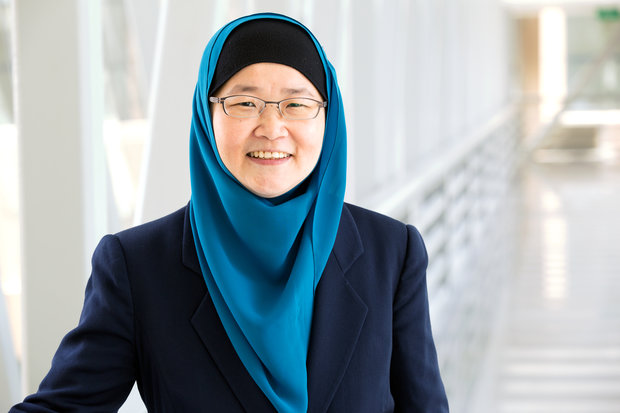AhlulBayt News Agency - Winner of the inaugural Mustafa Prize “Top Scientific Achievement” Award, Prof. Jackie Y. Ying, Executive Director of the Institute of Bioengineering and Nanotechnology, says the scientific contributions made by Muslim scientists could be more widely recognized by the world through the Mustafa Prize.
On 23 December 2015, the laureates of the first Mustafa Scientific Prize were announced as Professor Jackie Y. Ying from Singapore and Professor Omar Yaghi from Jordan. The Mustafa Prize is a top science and technology award granted biennially to the top researchers and scientists of the Organization of Islamic Cooperation (OIC) member states, the second largest inter-governmental organization in the world after the United Nations.
Granted to research that has improved human life and made tangible and cutting-edge innovations on the boundaries of science or has presented new scientific methodology, the Mustafa Prize recognizes achievements in the “Life Science and Medical Sciences”, “Nano Science and Nanotechnologies”, and “Information and Communication Science and Technologies”, and “Top Scientific Achievement” categories.
According to Dr. Hossein Zohour, Chairman of the Scientific Committee of the Mustafa Prize, “in the first three categories, the nominees must be citizens of one of the 57 Islamic countries while in the fourth category, the nominee must be Muslim but being a citizen of an Islamic country is not mandatory.”
Professor Ying, Executive Director of the Institute of Bioengineering and Nanotechnology (IBN) of A*STAR, has won the inaugural Mustafa Prize “Top Scientific Achievement” Award for “her great scientific and technological contributions and achievements to the synthesis of well-designed advanced nanostructured materials and systems, nanostructured biomaterials and miniaturized biosystems for various interesting applications.”
Her research has led to many new materials and systems with unique functionalities and size-dependent properties that tackle major challenges in medicine, chemistry and energy.
In an interview with Mehr News Agency, Prof. Ying highlights the importance of scientific awards that are especially tailored for the Muslim world.
Professor Jackie Ying, you have been chosen as the winner of the first Mustafa Scientific Prize. How were you introduced to this event? What were your expectations, seeing as this was its first round, and have your expectations been met?
I first heard about the award from the Iran Nanotechnology Initiative Council at a conference in Iran a couple of years ago. I am deeply honored to receive the inaugural Mustafa Prize. The Mustafa Prize is a very special award because it is named after the Prophet. Muslims are taught by the Prophet to pursue knowledge. Knowledge benefits us personally and the society as a whole. Scientific knowledge and breakthroughs impact the people at the global level. Knowledge also validates the existence of God. I hope that through the Mustafa Prize, the scientific contributions made by Muslim scientists will be more widely recognized by the world.
You have received Mustafa Prize in recognition of your efforts in development of 'stimulus response systems in targeted delivery of drugs' in the field of Nano-biotechnology. Would please tell us a little about your work, its significance in the world of science, and the aspects that you think had led to your work being chosen?
The glucose-sensitive nanoparticles can auto-regulate the release of insulin depending on the blood glucose levels. This drug delivery system bypasses the need for blood glucose monitoring with finger pricks, and allows insulin to be delivered orally or by nasal passage, instead of through injection. This technology would greatly benefit diabetic patients by helping to prevent hyperglycemic and hypoglycemic conditions and the associated organ damage. I co-founded SmartCells, Inc. to commercialize this novel nanomedicine. This spin-off company was acquired by Merck in 2010, with potential aggregate payments in excess of USD 500 million. Merck is currently bringing the technology through Phase I clinical trial.
In your opinion, what is the best aspect of international scientific competitions, such as Mustafa Prize, which are tailored especially for the Muslim world?
The Mustafa Prize is a remarkable initiative by the Iranian government to recognize Muslim scientists. Science and technology bring about many positive impacts on our societies. It is a common language that brings people together from all over the world.
In what ways do you think Mustafa Prize could complement the key initiatives of the Organization of Islamic Cooperation (OIC)?
It could complement the OIC initiatives by bringing the Muslim scientists together on education and research, and by facilitating technology exchange among the OIC member states and other nations.
Prof. Ying was born in Taipei, and raised in Singapore and New York. She received her B.E. and Ph.D. from The Cooper Union and Princeton University, respectively. She joined the faculty at Massachusetts Institute of Technology in 1992, where she was Professor of Chemical Engineering until 2005. She has been the Founding Executive Director of the Institute of Bioengineering and Nanotechnology in Singapore since 2003.
The Mustafa Prize was established in 2013 to recognize leading researchers and scientists of the Organization of Islamic Cooperation (OIC) member states, as well as Muslim researchers from around the world.
/129

